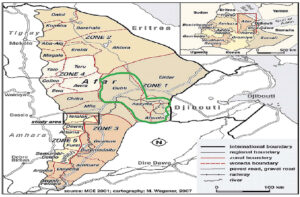The starting point is the pilot region of Arba Minch, where organic cultivation has already been established in some cooperatives. By including the north-eastern region of Afar, whose cotton is known for its quality and long fibre, the project partners hope to achieve higher yields.
The Awash River, which rises west of Addis Ababa in the regional state of Oromia, flows through the southern part of the Afar region and enables people to grow cotton and other crops in an otherwise dry environment. “Due to the climate, the available agricultural land must be used with great care. This emphasises the need for sustainable practices,” says Mesele Mekuria, who works as a cotton expert on site for the Partner Africa Ethiopia project (PAE).
“In our pilot zones in Arba Minch, the fibre quality fluctuates as the cotton there is not irrigated and rainfall is irregular. We want to utilise the potential that exists in Afar so that we can supply organic qualities for yarns that meet the quality requirements of German customers.”
Mesele Mekuria, PAE project manager for cotton

Asita, Dufti and Afambo Woredas in Zone 1, proposed for organic cotton farming.
In February, Mesele Mekuria assessed the situation in Afar together with Samson Asefa from the Ethiopian Ministry of Agriculture. They analysed the availability of arable land, water and inputs as well as soil quality, rainfall and temperature. ‘Farmers are very willing to switch to organic cotton farming,’ says Asefa. ‘The Asita, Afambo and Dubti zones (’woredas”) offer very good conditions for expanding our activities. The climate there is favourable and the soil is fertile. Even today, chemical fertilisers or pesticides are hardly used.” The PAE team estimates that there are well over 100,000 hectares of agricultural land in the three regions. They classify at least a tenth of this as suitable for organic cotton production.
However, in addition to the favourable conditions, there are also challenges: There is a lack of high-quality seed, agricultural technology and their own ginning plant. Above all, the farmers complain about the lack of a direct connection to their customers, the spinning mills. As a result, middlemen have been skimming off a large part of the margin. This is where PAE wants to start and ensure better networking with the industry.
“The cotton processing industry in Ethiopia is very interested in direct links with producers and hopes that the project will lead to both quality improvements and an increase in the volume of organically produced fibres. If we succeed in expanding the project’s activities to Afar, we will be able to significantly improve the quality of our yarns and fabrics over the next two years.”
Ageazi Hailemariam, Managing Director of the industry association ETGAMA